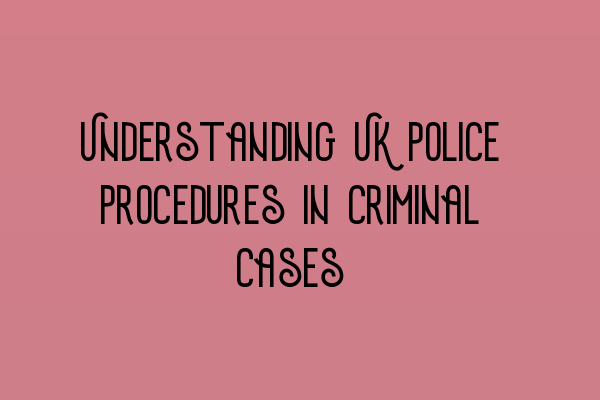Understanding UK Police Procedures in Criminal Cases
As criminal law solicitors at SQE Criminal Law & Practice Law UK, we believe it is essential for individuals to have an understanding of the police procedures followed in criminal cases in the UK. Being aware of these procedures can help you navigate the criminal justice system more effectively and protect your rights. In this blog post, we will provide an overview of key police procedures in criminal cases.
Arrest and Detention
When a crime is reported, the police have the power to arrest and detain individuals suspected of committing the crime. An arrest can be made if the police have reasonable grounds to believe that someone has committed or is about to commit a crime. The suspect can be taken into custody for questioning, but strict procedures must be followed to ensure their rights are respected.
Caution and Rights
Once arrested, the police must inform the suspect of the reason for their arrest and caution them. The caution includes the right to remain silent and the right to legal representation. The suspect should be fully aware of these rights before any questioning takes place.
It is crucial for individuals to exercise their right to legal representation during police interviews. Having a solicitor present can help ensure that the suspect’s rights are protected and that any evidence obtained is admissible in court.
Investigation
After making an arrest, the police will conduct an investigation to gather evidence in support of their case. This can include interviewing witnesses, examining the crime scene, collecting forensic evidence, and reviewing CCTV footage. The police must follow strict procedures to ensure the integrity of the evidence and avoid any potential for contamination or bias.
Charging Decision
Once the investigation is complete, the police will review the evidence gathered and decide whether to charge the suspect with a criminal offense. This decision is based on the likelihood of securing a conviction in court and the public interest in pursuing the case. If there is insufficient evidence, the suspect may be released without charge.
It is important to note that the decision to charge lies with the police, not the Crown Prosecution Service (CPS). However, the CPS can review and assess the evidence before a case proceeds to court.
Conclusion
Understanding UK police procedures in criminal cases is essential for anyone involved in or potentially facing criminal charges. By knowing your rights, exercising the right to legal representation, and being aware of the various stages of the police procedure, you can navigate the criminal justice system more effectively and protect your interests.
If you are preparing for the SQE 1 Practice Exam Questions or seeking SQE 1 Practice Mocks FLK1 FLK2to enhance your legal knowledge, SQE Criminal Law & Practice Law UK offers comprehensive preparation courses for both SQE 1 and SQE 2 exams. Stay informed about the SRA SQE Exam Dates and give yourself the best chance of success in your legal career.
